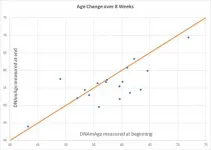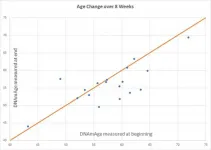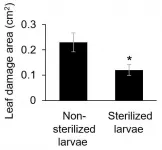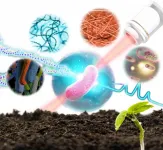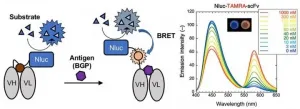Changes in how cholesterol breaks down in the body may accelerate progression of dementia
Study suggests that some cholesterol medications may impact signaling pathways in the brain, particularly in men
2021-05-27
(Press-News.org) The blood-brain barrier is impermeable to cholesterol, yet high blood cholesterol is associated with increased risk of Alzheimer's disease and vascular dementia. However, the underlying mechanisms mediating this relationship are poorly understood. A study published in the open-access journal PLOS Medicine by Vijay Varma and colleagues at the National Institute on Aging, part of the National Institutes of Health, in Baltimore, Maryland, suggests that disturbances in the conversion of cholesterol to bile acids (called cholesterol catabolism) may play a role in the development of dementia.
Little is known about how high blood cholesterol may lead to an increased risk of Alzheimer's and dementia, yet understanding the underlying processes may lay the foundation for discovering effective therapeutics. To investigate whether abnormalities in cholesterol catabolism through its conversion to bile acids is associated with development of dementia, researchers drew on more than 1800 participants from two prospective studies: the Baltimore Longitudinal Study of Aging (BLSA) and the Alzheimer's Disease Neuroimaging Initiative (ADNI).
First, the research team investigated whether cholesterol catabolism was associated with brain abnormalities typical of Alzheimer's and vascular dementia. They next tested whether exposure to cholesterol medications that block bile acid absorption into the bloodstream was associated with an increased risk of dementia among more than 26,000 patients from general practice clinics in the United Kingdom. Finally, they examined 29 autopsy samples from the BLSA to determine whether people with Alzheimer's disease tend to have altered levels of bile acids in their brains.
The authors found that the risk of vascular dementia increased for males, but not females, with greater number of prescriptions of bile acid blocking drugs. Their findings suggest that cholesterol catabolism and bile acid synthesis may impact dementia progression through sex-specific effects on brain signaling pathways. However, additional studies are needed as the research was limited by the relatively small numbers of autopsy samples. In addition, experimental studies are required to better understand the role of cholesterol breakdown in dementia.
"To further extend these findings, we are now testing whether approved drugs for other diseases that may correct bile acid signaling abnormalities in the brain could be novel treatments for Alzheimer's disease and related dementias," said senior author Madhav Thambisetty, M.D., Ph.D., investigator and chief of the Unit of Clinical and Translational Neuroscience in the NIA's Laboratory of Behavioral Neuroscience. "These analyses are being pursued in the Drug Repurposing for Effective Alzheimer's Medicines (DREAM) study."
INFORMATION:
Research Article
Peer reviewed; Observational; Humans
In your coverage please use this URL to provide access to the freely available paper:
http://journals.plos.org/plosmedicine/article?id=10.1371/journal.pmed.1003615
Funding: This research was supported in part by the intramural program of the National Institute on Aging (NIA) and the National Cancer Institute (NCI). ROSMAP is supported by NIA grants P30AG10161, R01AG15819, R01AG17917, and U01AG61356. The ADMC is supported by National Institute on Aging (NIA): grant R01AG046171, a component of the Accelerated Medicines Partnership for AD (AMP-AD) Target Discovery and Preclinical Validation Project; grant RF1 AG0151550, a component of the M2OVE-AD Consortium (Molecular Mechanisms of the Vascular Etiology of AD-Consortium; and RF1AG057452, R01AG059093, RF1AG058942, U01AG061359, U19AG063744 and FNIH: #DAOU16AMPA. Specific authors, indicated in parentheses, were supported by additional grants: NIA RF1 AG058942 and R01 AG057452 (RKD); NLM R01 LM012535 and NIA R03 AG054936 (KN). MT is grateful for funding support from the Andrew and Lillian A. Posey foundation to the Clinical and Translational Neuroscience Section, Laboratory of Behavioral Neuroscience, NIA. The funders had no role in study design, data collection and analysis, decision to publish, or preparation of the manuscript.
Competing Interests: I have read the journal's policy and the authors of this manuscript have the following competing interests: DFW has prior contracts with Roche Neuroscience, AVID pharma, Lundbeck.
Citation: Varma VR, Wang Y, An Y, Varma S, Bilgel M, Doshi J, et al. (2021) Bile acid synthesis, modulation, and dementia: A metabolomic, transcriptomic, and pharmacoepidemiologic study. PLoS Med 18(5): e1003615. https://doi.org/10.1371/journal.pmed.1003615
[Attachments] See images for this press release:
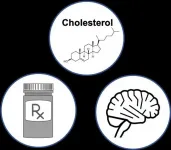
ELSE PRESS RELEASES FROM THIS DATE:
2021-05-27
Quantum systems are considered extremely fragile. Even the smallest interactions with the environment can result in the loss of sensitive quantum effects. In the renowned journal Science, however, researchers from TU Delft, RWTH Aachen University and Forschungszentrum Jülich now present an experiment in which a quantum system consisting of two coupled atoms behaves surprisingly stable under electron bombardment. The experiment provide an indication that special quantum states might be realised in a quantum computer more easily than previously thought.
The so-called decoherence is one of the greatest enemies of the quantum physicist. Experts understand by this the decay of quantum states. This inevitably occurs when the system interacts with its environment. In ...
2021-05-27
A groundbreaking clinical trial shows we can reduce biological age (as measured by the Horvath 2013 DNAmAge clock) by more than three years in only eight weeks with diet and lifestyle through balancing DNA methylation. A first-of-its-kind, peer-reviewed study provides scientific evidence that lifestyle and diet changes can deliver immediate and rapid reduction of our biological age. Since aging is the primary driver of chronic disease, this reduction has the power to help us live better, longer. The study, released on April 12, utilized a randomized controlled clinical trial conducted among 43 healthy adult males between the ages of 50-72. The 8-week treatment program included diet, sleep, exercise and relaxation ...
2021-05-27
The bacterium, which they named Candidatus Phytoplasma dypsidis was found to cause a fatal wilt disease. This new discovery was reported in the International Journal of Systematic and Evolutionary Microbiology.
In 2016, several ornamental palms within a conservatory in the Cairns Botanic Gardens, Queensland, died mysteriously. A sample was taken from one of the diseased plants and investigated by Dr Richard Davis and colleagues from the Australian Government Department of Agriculture, Water and the Environment, and state and local government. They compared the characteristics and genome of the bacterium identified as the cause of the disease and found the ...
2021-05-27
Study Exploring Optimization of Duplex Velocity Criteria for Diagnosis of Internal Carotid Artery (ICA) Stenosis Published Online
Online first in Vascular Medicine, researchers from the Intersocietal Accreditation Commission (IAC) Vascular Testing division report findings of their multi-centered study of duplex ultrasound for diagnosis of internal carotid artery (ICA) stenosis. 1
The study was developed in response to wide variability in the diagnostic criteria used to classify severity of ICA stenosis across vascular laboratories nationwide and following a survey of members of IAC-accredited ...
2021-05-27
Aging published "Potential reversal of epigenetic age using a diet and lifestyle intervention: a pilot randomized clinical trial" which reported on a randomized controlled clinical trial conducted among 43 healthy adult males between the ages of 50-72. The 8-week treatment program included diet, sleep, exercise and relaxation guidance, and supplemental probiotics and phytonutrients. Genome-wide DNA methylation analysis was conducted on saliva samples using the Illumina Methylation Epic Array and DNAmAge was calculated using the online Horvath DNAmAge clock (also published in Aging). The diet and lifestyle treatment was associated with a 3.23 years decrease in DNAmAge compared with controls. DNAmAge of those in the treatment group decreased by an average 1.96 ...
2021-05-27
More than 500,000 people have died from COVID-19 in Latin America and the Caribbean, demonstrating the health and economic inequalities throughout the region. A new article analyzes seven books* that discuss these inequalities, including questions of who gets health care and what interdependent roles societies, social movements, and governments play. To end inequality in the region, the author calls for a universal approach to health care.
The article, by a professor at Carnegie Mellon University (CMU), appears in the June 2021 issue of Latin American Research Review, a journal published by the Latin American Studies Association.
"These books break new ground and contribute to our understanding of some of the most important health ...
2021-05-27
Although insect larvae may seem harmless to humans, they can be extremely dangerous to the plant species that many of them feed on, and some of those plant species are important as agricultural crops. Although plants cannot simply flee from danger like animals typically would, many have nonetheless evolved ingenious strategies to defend themselves from herbivores. Herbivorous insect larvae will commonly use their mouths to smear various digestive proteins onto plants that they want to eat, and when plants detect chemicals commonly found in these oral secretions, ...
2021-05-27
AMES, Iowa - Materials engineers don't like to see line defects in functional materials.
The structural flaws along a one-dimensional line of atoms generally degrades performance of electrical materials. So, as a research paper published today by the journal Science reports, these linear defects, or dislocations, "are usually avoided at all costs."
But sometimes, a team of researchers from Europe, Iowa State University and the U.S. Department of Energy's Ames Laboratory report in that paper, engineering those defects in some oxide crystals can actually increase electrical performance.
The research team - led by Jürgen Rödel and Jurij Koruza of the Technical University of Darmstadt in Germany - found certain defects produce significant improvements in two key measurements ...
2021-05-27
Researchers from the Single-Cell Center at the Qingdao Institute of Bioenergy and Bioprocess Technology (QIBEBT) of the Chinese Academy of Sciences have developed a technique to sort and sequence the genome of bacteria in soil one bacterial cell at a time, while also identifying what its function is in the soil environment.
Their study was published in the journal mSystems on May 27.
Soil is home to a vast and complex microbiome, which features arguably the highest genomic diversity and widest heterogeneity of metabolic activities of cells on Earth. In turn, these metabolic activities can in principle provide the foundation for industrial production of numerous compounds of value.
The ability to pinpoint ...
2021-05-27
Immunosensors are widely used in immunoassays to detect antigens. One such immunosensor is a quenchbody (Q-body), which contains a modified antibody fragment with a quenched fluorescent dye. When an antigen binds to the Q-body, the dye leaves the antibody and the fluorescence intensifies. The change in fluorescence intensity is easy to measure, making Q-body-based antigen detection systems incredibly simple. However, this method requires an external light source to excite the electrons in the fluorescent dye to produce luminescence.
One way to solve this is to induce luminescence by an alternative method. To achieve this, researchers ...
LAST 30 PRESS RELEASES:
[Press-News.org] Changes in how cholesterol breaks down in the body may accelerate progression of dementia
Study suggests that some cholesterol medications may impact signaling pathways in the brain, particularly in men


